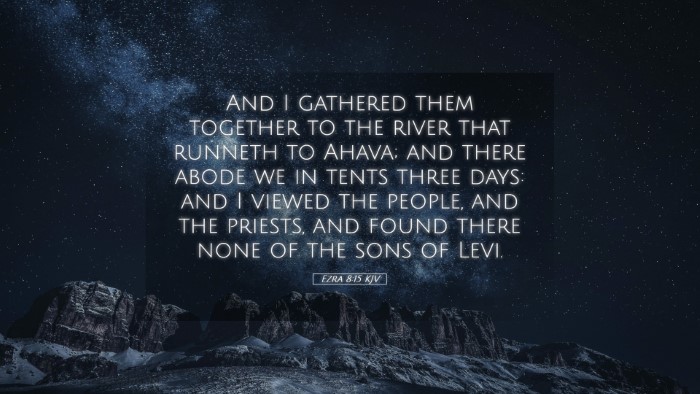Commentary on Ezra 8:15
Ezra 8:15 recounts a pivotal moment in the return of the Jewish exiles to Jerusalem, as Ezra gathers the people at the river Ahava. This event is significant not only for its historical context but also for its spiritual implications. The verse states:
"And I gathered them together to the river that runneth to Ahava; and there abode we in tents three days: and I viewed the people and the priests, and found there none of the sons of Levi."
Context and Background
The journey back to Jerusalem was not merely a geographical relocation for the exiles; it marked a return to their covenantal identity and relationship with God. Ezra, a scribe and priest, was tasked with leading this group back and ensuring the observance of the Law. His gathering at the river Ahava showcased his intention to prepare the people spiritually and logistically for the journey ahead.
Understanding the Gathering
Ezra's gathering at the river exemplifies several key principles:
- Leadership and Preparation: Ezra's initiative to gather the people signifies the importance of strong leadership in communal spiritual endeavors. Matthew Henry notes that Ezra’s foresight in preparing the group was essential for the success of their mission.
- Reflection and Self-Examination: The three days spent at the river allowed for reflection and self-examination. Albert Barnes emphasizes that this time was crucial for the people to assess their readiness to undertake the difficult journey back to Jerusalem.
- The Role of Levites: Ezra's discovery that none of the sons of Levi were present highlights a critical concern for the proper worship and service in the temple. Adam Clarke explains that the Levites held a special role in leading worship and ensuring sacrifices were made according to the Law.
Theological Significance
As Ezra surveyed the people and found a lack of Levites, several theological themes emerge:
- The Necessity of Spiritual Leaders: The absence of Levites speaks to the need for spiritual leaders within the community. The priests and Levites were integral to the worship practices described in the Law. Ezra's concern reflects God's expectation of order and reverence in worship.
- The Call to Holiness: The return to Jerusalem was not just a physical journey but a return to holiness and covenant faithfulness. The lack of Levites indicates a spiritual deficiency that needed to be addressed before the journey could continue effectively.
- God’s Provision: This scenario emphasizes that while the people must be diligent, ultimately it is God who provides for their needs. Clarke underscores that Ezra’s leadership, coupled with God’s divine providence, would ensure that, even in the absence of Levites, He would raise leaders who would fulfill His purposes.
Application for Today
For contemporary pastors, students, theologians, and scholars, Ezra 8:15 serves as a poignant reminder of the following:
- The Importance of Gathering: As Ezra gathered the people, we too must prioritize community gatherings for spiritual reflection, teaching, and preparation for ministry.
- Identifying and Equipping Leaders: Like Ezra, we are called to recognize and equip leaders within our communities. This requires discernment and proactive engagement with the needs of the community.
- Spiritual Readiness: The call to spiritual readiness remains ever relevant. Before embarking on any venture, whether personal or corporate, reflection on one’s spiritual state is essential.
Conclusion
The insights drawn from Ezra 8:15 provide a profound understanding of leadership, community, and divine dependence. Ezra’s actions remind us of the importance of preparing ourselves spiritually and communally as we seek to fulfill God’s calling. As we gather to reflect and discern our paths, may we do so with the understanding that we are a people set apart for God's purposes.


